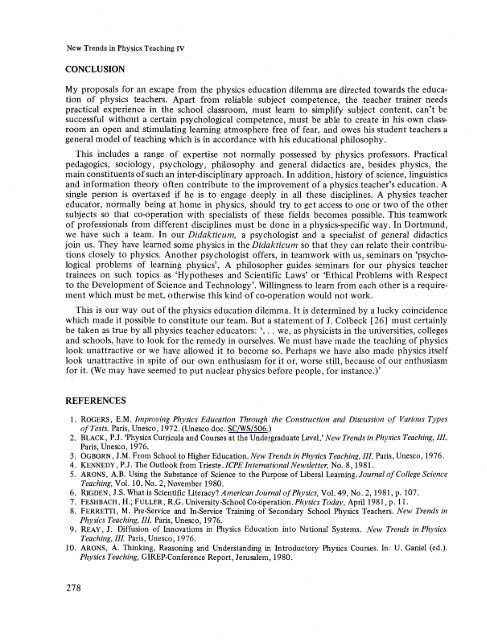New trends in physics teaching, v.4; The ... - unesdoc - Unesco
New trends in physics teaching, v.4; The ... - unesdoc - Unesco
New trends in physics teaching, v.4; The ... - unesdoc - Unesco
Create successful ePaper yourself
Turn your PDF publications into a flip-book with our unique Google optimized e-Paper software.
<strong>New</strong> Trends <strong>in</strong> Physics Teach<strong>in</strong>g IV<br />
CONCLUSION<br />
My proposals for an escape from the <strong>physics</strong> education dilemma are directed towards the education<br />
of <strong>physics</strong> teachers. Apart from reliable subject competence, the teacher tra<strong>in</strong>er needs<br />
practical experience <strong>in</strong> the school classroom, must learn to simplify subject content, can’t be<br />
successful without a certa<strong>in</strong> psychological competence, must be able to create <strong>in</strong> his own classroom<br />
an open and stimulat<strong>in</strong>g learn<strong>in</strong>g atmosphere free of fear, and owes his student teachers a<br />
general model of teach<strong>in</strong>g which is <strong>in</strong> accordance with his educational philosophy.<br />
This <strong>in</strong>cludes a range of expertise not normally possessed by <strong>physics</strong> professors. Practical<br />
pedagogics, sociology, psychology, philosophy and general didactics are, besides <strong>physics</strong>, the<br />
ma<strong>in</strong> constituents of such an <strong>in</strong>ter-discipl<strong>in</strong>ary approach. In addition, history of science, l<strong>in</strong>guistics<br />
and <strong>in</strong>formation theory often contribute to the improvement of a <strong>physics</strong> teacher’s education. A<br />
s<strong>in</strong>gle person is overtaxed if he is to engage deeply <strong>in</strong> all these discipl<strong>in</strong>es. A <strong>physics</strong> teacher<br />
educator, normally be<strong>in</strong>g at home <strong>in</strong> <strong>physics</strong>, should try to get access to one or two of the other<br />
subjects so that co-operation with specialists of these fields becomes possible. This teamwork<br />
of professionals from different discipl<strong>in</strong>es must be done <strong>in</strong> a <strong>physics</strong>-specific way. In Dortmund,<br />
we have such a team. In our Didakticum, a psychologist and a specialist of general didactics<br />
jo<strong>in</strong> us. <strong>The</strong>y have learned some <strong>physics</strong> <strong>in</strong> the Didakticum so that they can relate their contributions<br />
closely to <strong>physics</strong>. Another psychologist offers, <strong>in</strong> teamwork with us, sem<strong>in</strong>ars on ‘psychological<br />
problems of learn<strong>in</strong>g <strong>physics</strong>’. A philosopher guides sem<strong>in</strong>ars for our <strong>physics</strong> teacher<br />
tra<strong>in</strong>ees on such topics as ‘Hypotheses and Scientific Laws’ or ‘Ethical Problems with Respect<br />
to the Development of Science and Technology’. Will<strong>in</strong>gness to learn from each other is a requirement<br />
which must be met, otherwise this k<strong>in</strong>d of co-operation would not work.<br />
This is our way out of the <strong>physics</strong> education dilemma. It is determ<strong>in</strong>ed by a lucky co<strong>in</strong>cidence<br />
which made it possible to constitute our team. But a statement of J. Colbeck [ 261 must certa<strong>in</strong>ly<br />
be taken as true by all <strong>physics</strong> teacher educators: ‘. . . we, as physicists <strong>in</strong> the universities, colleges<br />
and schools, have to look for the remedy <strong>in</strong> ourselves. We must have made the teach<strong>in</strong>g of <strong>physics</strong><br />
look unattractive or we have allowed it to become so. Perhaps we have also made <strong>physics</strong> itself<br />
look unattractive <strong>in</strong> spite of our own enthusiasm for it or, worse still, because of our enthusiasm<br />
for it. (We may have seemed to put nuclear <strong>physics</strong> before people, for <strong>in</strong>stance.)’<br />
REFERENCES<br />
1. ROGERS, E.M. Improv<strong>in</strong>g Physics Education Through the Construction and Discussion of Various Types<br />
of Tests. Paris, <strong>Unesco</strong>, 1972. (<strong>Unesco</strong> doc. SC/WS/506.)<br />
2. BLACK, P.J. ‘Physics Curricula and Courses at the Undergraduate Level.’<strong>New</strong> Trends <strong>in</strong> Physics Teach<strong>in</strong>g, IZI.<br />
Paris, <strong>Unesco</strong>, 1976.<br />
3. OGBQRN, J.M. From School to Higher Education. <strong>New</strong> Trends <strong>in</strong> Physics Teach<strong>in</strong>g, IIZ. Paris, <strong>Unesco</strong>, 1976.<br />
4. KENNEDY, P.J. <strong>The</strong> Outlook from Trieste. ICPE International <strong>New</strong>sletter, No. 8, 1981.<br />
5. ARONS, A.B. Us<strong>in</strong>g the Substance of Science to the Purpose of Liberal Learn<strong>in</strong>g. Journal of College Science<br />
Teach<strong>in</strong>g, Vol. 10, No. 2, November 1980.<br />
6. RIGDEN, J.S. What is Scientific Literacy? American Journal of<strong>physics</strong>, Vol. 49, No. 2, 1981, p. 107.<br />
7. FESHBACH, H.; FULLER, R.G. University-School Coaperation.Physics Today, April 1981, p. 11.<br />
8. FERRETTI, M. Pre-Service and In-service Tra<strong>in</strong><strong>in</strong>g of Secondary School Physics Teachers. <strong>New</strong> Trends <strong>in</strong><br />
Physics Teach<strong>in</strong>g, III. Paris, <strong>Unesco</strong>, 1976.<br />
9. REAY, J. Diffusion of Innovations <strong>in</strong> Physics Education <strong>in</strong>to National Systems. <strong>New</strong> Trends <strong>in</strong> Physics<br />
Teach<strong>in</strong>g, ZII. Paris, <strong>Unesco</strong>, 1976.<br />
10. ARONS, A. Th<strong>in</strong>lung, Reason<strong>in</strong>g and Understand<strong>in</strong>g <strong>in</strong> Introductory Physics Courses. In: U. Ganiel (ed.).<br />
Physics Teach<strong>in</strong>g, GIREP-Conference Report, Jerusalem, 1980.<br />
278
















